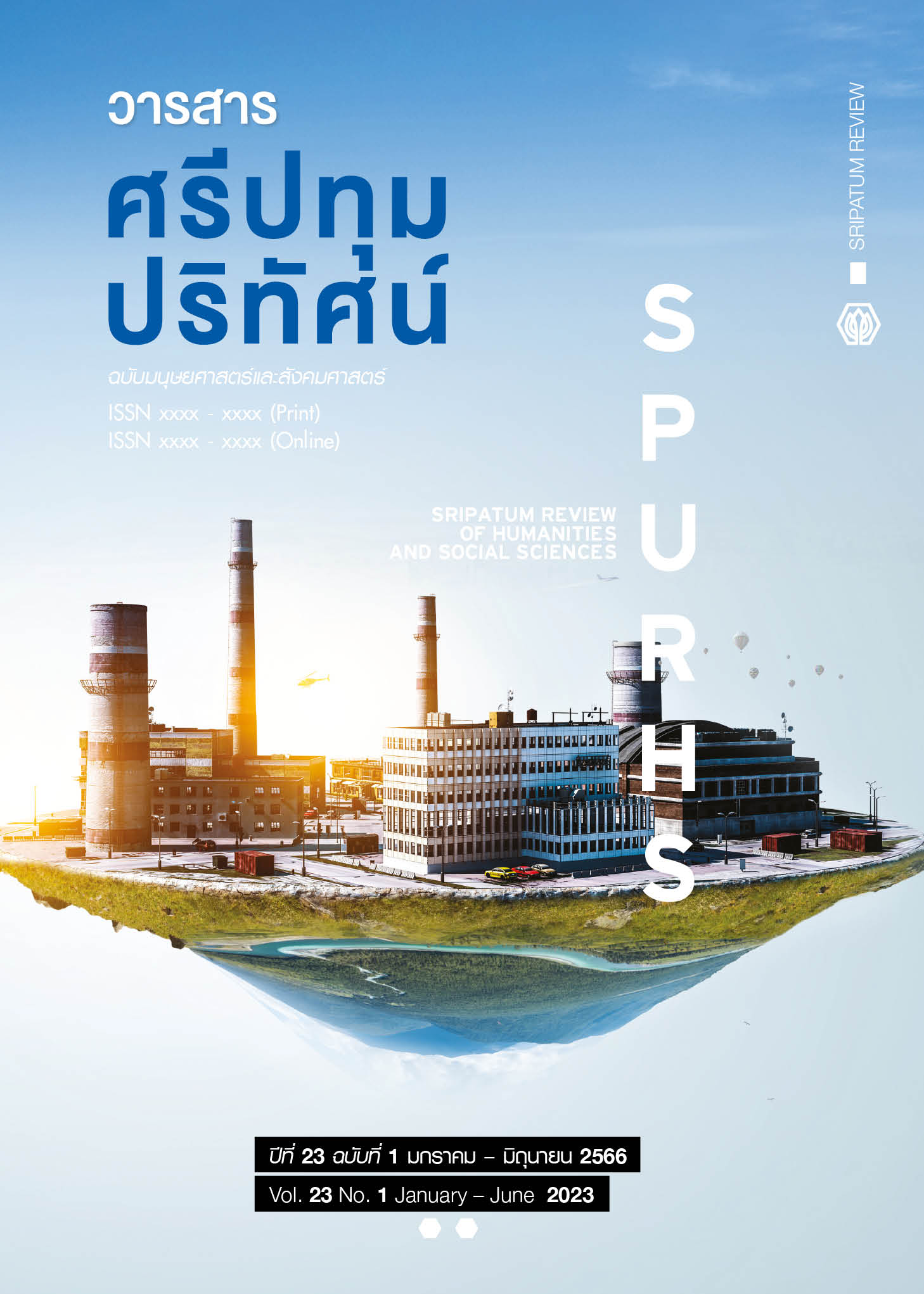The Relationships Between Destination Branding and Destination Selection: A Study of Generation Y in Bangkok
Main Article Content
Abstract
The aim of this paper is to investigate the relationships between destination branding and the choice of destination of Generation Y in Bangkok, to propose the development of the destination to be recognized and chosen by tourists. This is a qualitative study whose data was collected by interviewing 150 key informants in four central locations of Bangkok: Sathorn, Silom, Siam, and Ari, where the business centers and office buildings are located. The results show that Generation Y in Bangkok travels more domestically during and after Covid-19. There is a relationship between destination branding and destination selection by Generation Y in Bangkok, as they want to travel to a destination where they can showcase themselves on social media. Generation Y travels throughout the year to refresh themselves from their daily duties and responsibilities. Coasts and historical sites are the most popular destinations because there are plenty of activities for them and their family to do, both indoors and outdoors. To be considered as a destination, many destinations need to improve their branding and other facilities and stand out from other places.
Article Details

This work is licensed under a Creative Commons Attribution-NonCommercial-NoDerivatives 4.0 International License.
1. กองบรรณาธิการสงวนสิทธิ์ในการพิจารณาและตัดสินการตีพิมพ์บทความในวารสาร
2. บทความทุกเรื่องจะได้รับการตรวจสอบทางวิชาการโดยผู้ทรงคุณวุฒิ แต่ข้อความและเนื้อหาในบทความที่ตีพิมพ์เป็นความรับผิดชอบของผู้เขียนแต่เพียงผู้เดียว มิใช่ความคิดเห็นและความรับผิดชอบของมหาวิทยาลัยศรีปทุม
3. การคัดลอกอ้างอิงต้องดำเนินการตามการปฏิบัติในหมู่นักวิชาการโดยทั่วไป และสอดคล้องกับกฎหมายที่เกี่ยวข้อง
References
Adams, R. (2023). 31 Millennial Spending Habits & Income Statistics to Know, 2023. [Online]. Retrieved January 30, 2023, from: https://youngandtheinvested.com/millennial-spending-habits/.
Adisornprasert, W. (2019). New concepts and branding for travel destinations. [Online]. Retrieved June 09, 2022, from: https://intelligence.businesseventsthailand.com/en/blog/pata-blog-ep1.
Agarwal, R. and Kariyapol, T. (2018). Tourism and its impacts to the sociocultural changes A case study of the Khaosan Road, Bangkok. Journal of Sripatum Review of Humanities and Social Sciences, 18, 146-152.
Ahmadova, E. (2018). The Common/Unique and Cognitive/Conative Model of Destination Image: The Case of Azerbaijan. The Journal of Faculty of Economics and Administrative Sciences, 23(1), 333-346.
Barreto, J.J., Rubio, N., and Martínez, S.C. (2019). The online destination brand experience: Development of a sensorial–cognitive–conative model. International Journal of Tourism Research, 21(2), 245-258.
Bochert, R., Cismaru, L., and Foris, D. (2017). Connecting the Members of Generation Y to Destination Brands: A Case Study of the CUBIS Project. Sustainability, 9(7), 1-20.
Cardona, A.R., Sunb, Q., Lic, F., and White, D. (2017). Assessing the Effect of Personal Cultural Orientation on Brand Equity and Revisit Intention: Exploring Destination Branding in Latin America. Journal of Global Marketing, 30(5), 282-296.
Cavalheiro, M.B., Joia, L.A., Cavalheiro, G.M.C., and Mayer, V.F. (2021). Smart Tourism Destinations: (Mis)Aligning Touristic Destinations and Smart City Initiatives. Brazilian Administration Review, 18(1), 1-28.
Chinwanno, S. (2020). The Future of Thai Tourism and Global Warming. [Online]. Retrieved June 14, 2022, from: https://researchcafe.org/the-future-of-thai-tourism/.
Chittangwattana, B. (2015). Knowledge of tourism. Journal of Hospitality and Tourism Chiangrai Rajabhat University, 2(1), 1-15.
Inthawirat, B., and Siwaphithak, S. (2015). A study of the behavior of Gen Y consumers buying products online in Bangkok and its vicinity. DPU Graduate Studies Journal, 3(3), 137-147.
Kattiyavong. P. (2019). Thai Tourism Industry Awakens to Climate Change. [Online]. Retrieved June 14, 2022, from: https://www.thai-german-cooperation.info/th/thai-tourism-industry-on-alert-to-climate-change/.
Lerspipatthananon, W. (2018). Thai Gen Y People’ Travelling Behavior and Motivation Patterns. Dusit Thani College Journal, 12, 134-149.
Madhyamapurush, W. (2022). Post Covid-19 Travel Behaviour of Thai Tourists in the Northern Region of Thailand. Journal of Sustainable Tourism Development, 4(1), 17-31.
Matikiti-Manyevere, R., and Hattingh, J. (2020). Factors Influencing Intention to Use Social Media Sites for Holiday Destination Selection by the Young Generation. African Journal of Hospitality, Tourism and Leisure, 9(3), 302-318.
Mongkol, N. (2020). Gen Y/Gen Me the group that rules the world. [Online]. Retrieved June 08, 2022, From: https://www.dmh.go.th/news/view.asp?id=1251.
Monica, F., and Olimpia, B. (2020). Theoretical Framework about Tourism Destination Competitiveness. Economic Sciences, 1, 32-38.
National Statistical Office. (2022). Demographic Statistics: Population and Housing. [Online]. Retrieved June 21, 2022, From: http://statbbi.nso.go.th/staticreport/page/sector/th/01.aspx.
OKMD. (2017). New Gen Is Now. [Online]. Retrieved January 27, 2023, from: https://www.okmd.or.th/upload/pdf/2560/the%20opportunity%20by%20okmd/Booklet_New_Gen.pdf.
Phangnga, A., Chongsitthiphon, S., Wongmontha, S., and Techakana, C. (2017). Destination branding for competitiveness advantage. A case study Pattaya Tourism, Chonburi province. Research and Development Journal, Loei Rajabhat University, 12(39), 25-36.
Safeer, A.A., He, Y., Lin, Y., Abrar, M., and Nawaz, Z. (2021). Impact of perceived brand authenticity on consumer behavior: an evidence from generation Y in Asian perspective. International Journal of Emerging Markets, 17(6), 1746-8809.
Tomic, S., Lekovic, K., and Tadic, J. (2019). Consumer behaviour: the influence of age and family structure on the choice of activities in a tourist destination. Economic Research-Ekonomska Istra Zivanja, 32(1), 755–771.
Walsh, J., and Apivantanaporn, T. (2015). Destination Management of Small Islands: The Case of Koh Mak. ACTA Universitatis Danubius, 11(3), 174-199.
World Tourism Organization. (2022). Glossary of tourism terms. [Online]. Retrieved March 22, 2022, from: https://www.unwto.org/glossary-tourism-terms.


